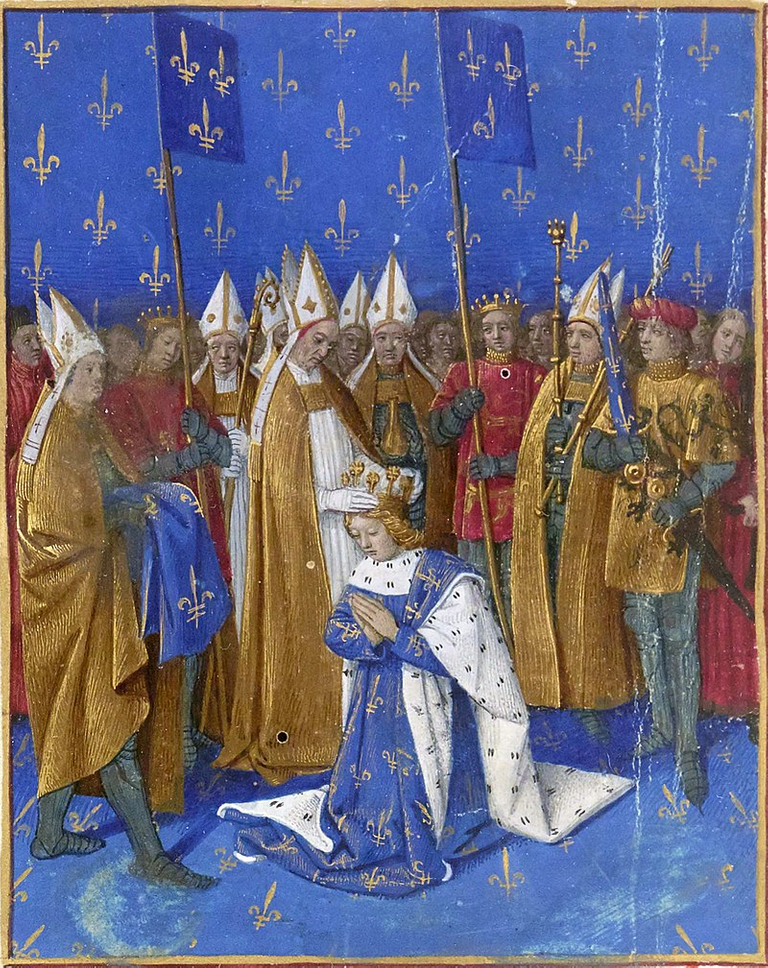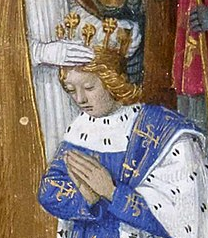Greetings, friends!
I wanted to write for the Cristal prompt, in The Ink Well's Fiction Call for Fiction. The writers in the community produced fantastic stories! I wanted to work on a Historical Fiction text about King Charles VI and his "Delirium of Cristal".

Beware, the king breaks!
King Charles began to be called Charles the Good.
"I want to see how the people live!" he said one day.
He rode in his chariot with his advisors and toured the village.
Everyone recognized the king's chariot. Everyone, men and women, big and small, stopped to watch him go by.
He could see up close how the subjects lived their simple lives, but he wanted more. He wished to see what the houses looked like inside.
Few kings have done what Charles the Good did that time. Charles stepped down from his chariot, walked down his red carpet and entered a peasant house.
The woman of the house, surprised by the royal visit, wiped her hands on her apron and offered him a seat.
So this is how my subjects live! Charles thought as he looked carefully around him.
There was a cauldron boiling on the hearth fire. The dwelling had a thatched roof on thick logs that rested on sturdy wooden struts.
Charles was a very young king, not yet twenty years old. He began to be king when he was still a boy of eleven.
On that visit the king was able to see up close the chickens, the cows, the farm animals with their plows. He was tempted to touch all the objects, the tin vessels, the wooden spoons and plates, the baked clay pots.
Kings lead very busy lives. They must always be thinking about starting or stopping a war, they must consider matters of life and death, they must attend countless meetings to win whole countries, arrange marriages with princesses, keep abreast of the latest innovations in fashion and art... but, above all, they must take great care of themselves. There are very few kings in the world!
Charles knew how the members of the courts took care of themselves, but he did not know how his subjects took care of themselves. So he became very interested in how people looked.
He stopped to think about it. He looked at the peasant women, with their wide raw linen skirts and their wicker baskets on their heads. Inside the baskets glistened carrots, watercress, cabbages, apples, red stalks of rhubarb and bright bunches of strawberries.
"How beautiful they are! Though their skins and robes look as one, the texture of their flesh resembles that of polished wood, and their eyes and looks are like those of any tender four-legged animal." Reflected the King.
Charles always had strange thoughts, it must be understood that he was king from a very young age and no one contradicted him. When the king returned to the palace he was convinced that his subjects were made of very good wood.
Charles was very satisfied with his visit to the village. He returned to the palace and felt the contrast between the objects that surrounded him and those of the peasants. He caressed, to contrast his impressions, their beautiful enameled vases, raised, to cross them with his eyes, the glasses of magnificent crystal, approached the wall of mirrors and stopped to study their fine features, delicate, soft, pearly, framed by the gold that surrounded the mirrors. Charles was pleased.
"Outside the palace people live a simple, wholesome life, with their wooden objects marking their natural temperament," he mused.
Inside the palace he felt the joy of living among its shiny, fine and fragile crystal objects.
That night Charles the Good had a dream: he was participating in a masquerade party to which the whole town was invited. People were dancing while taking all kinds of fruits from large wicker baskets and offering them to others. It was all laughter and joy until it was time to take off the masks. Then Charles saw with astonishment that all, nobles and commoners alike, had wooden faces. The king touched his own face by pressing his fingers upon it. His silk gloves slipped over his smooth, stiff complexion. For a moment, Charles thought that he, the king, was also made of wood. A mirror appeared in the dream and showed him his features, polished, shining, bluish. Carlos understood. No. He was not made of wood, he was made of glass!
When Charles got out of bed he was convinced that he had received a divine revelation. God was telling him that he had to be very careful with his life, that by any carelessness he could end up as a shattered king.
Charles understood that, being made of glass, he had to start walking very slowly.
"I need fluffier cushions for my throne, my rugs need to be fluffier and my clothes need to protect me from any rubbing. It has to be reinforced. I can't fall off for any reason," Charles insisted.
Thus, between episodes of immobility for many hours, explanations about his divine origin - which made him a fragile and transitory vessel of God's spirit -, reluctance to be touched to avoid stains, Charles finished living his fragile life.
Those who wrote his story tell that his mind exploded into a thousand pieces and he plunged into the most complete madness.
Thanks for reading!

@gracielaacevedo

Saludos, amigos!
Quise escribir para el prompt Cristal, en la convocatoria de Ficción de The Ink Well. Los escritores de la comunidad produjeron fantásticas historias. Yo quise trabajar un texto de Ficción histórica sobre la figura del rey Carlos VI y su "Delirio de Cristal".
Cuidado, se rompe el rey!
El rey Carlos comenzó a ser llamado Carlos El Bueno.
¡Quiero ver cómo vive el pueblo! dijo un día.
Montó en su carroza con sus asesores y recorrió la villa.
Todos reconocían la carroza del rey. Todos, hombres y mujeres, grandes y pequeños se detenían para mirarlo pasar.
Pudo ver de cerca cómo los súbditos vivían sus vidas sencillas, pero quiso más. Deseo ver cómo eran las casas por dentro.
Pocos reyes han hecho lo que hizo esa vez Carlos El Bueno. Carlos bajó de su carroza, caminó por su alfombra roja y entró a una casa campesina.
La mujer de la casa, sorprendida por la real visita, limpió sus manos en el delantal y le ofreció un asiento.
Conque así es como viven mis súbditos! Pensó Carlos mientras miraba detenidamente todo a su alrededor.
Había un caldero hirviendo sobre el fuego del hogar. La vivienda tenía un techo de paja sobre gruesos troncos que a su vez descansaban sobre sólidos puntales de madera.
Carlos era un rey muy joven, aún no había llegado a cumplir 20 años. Comenzó a ser rey cuando aún era un niño de once.
En esa visita el rey pudo ver de cerca las gallinas, las vacas, los animales de labranza con sus arados. Tuvo la tentación de tocar todos los objetos, los vasos de estaño, las cucharas y platos de madera, las cazuelas de arcilla cocida.
Los reyes tienen una vida muy comprometida. Deben pensar siempre en hacer o en detener una guerra, deben considerar cuestiones de vida o de muerte, es necesario que asistan a Innumerables reuniones para ganar países completos, para acordar matrimonios con princesas, para estar al tanto de las últimas innovaciones en la moda y en el arte… pero lo más importante es que deben cuidarse mucho a sí mismos. ¡Hay muy pocos reyes en el mundo!
Carlos sabía cómo se cuidaban a sí mismos los integrantes de las cortes, pero no sabía cómo se cuidaban sus súbditos. Por ello se interesó mucho en como lucían las personas.
Se detuvo a pensar sobre ello. Miró a las muchachas campesinas, con sus amplias faldas de lino crudo que cargaban sus cestas de mimbre sobre sus cabezas. Adentro de las cestas, brillaban las zanahorias, los berros, los repollos, las manzanas, los rojos tallos de ruibarbo y los brillantes racimos de frutillas.
“Son tan hermosas! Aunque sus pieles y ropajes parecen una sola cosa, la textura de sus carnes parecen las de la madera pulida, y sus ojos y miradas son como los de cualquier tierno animal de cuatro patas.” Reflexionaba el Rey.
Carlos siempre tuvo pensamientos extraños, hay que entender que él fue rey desde muy pequeño y nadie lo contradecía. Cuando El rey regresó a palacio llegó convencido de que sus súbditos estaban hechos de muy buena madera.
Carlos quedó muy complacido con su visita al pueblo. Regresó a palacio y sintió el contraste entre los objetos que lo rodeaban a él y los de los campesinos. Acarició, para contrastar sus impresiones, sus bellos jarrones esmaltados, levantó, para atravesarlas con la vista, las copas hechas de magnifico cristal, se llegó hasta la pared de los espejos y se detuvo para estudiar sus finas facciones, delicadas, tersas, nacaradas, enmarcadas por el oro que rodeaba a los espejos. Carlos estaba satisfecho.
“Fuera de palacio el pueblo vive una vida sencilla y sana, con sus objetos de madera que marcan su temperamento natural” cavilaba.
Adentro de palacio él sentía regocijo de vivir entre sus brillantes, finos y frágiles objetos de cristal.
Esa noche Carlos El Bueno tuvo un sueño: participaba de una fiesta de máscaras en la que estaba convidado todo el pueblo. Las personas bailaban mientras tomaban, de grandes cestas de mimbre, todo tipo de frutas y se las ofrecían unos a otros. Todo era risas y alegría hasta que llegó el momento de quitarse las máscaras. Entonces Carlos vio asombrado que todos, nobles y plebeyos, tenían un rostro de madera. El rey tocó su propia cara presionando sus dedos sobre ella. Sus guantes de seda resbalaron sobre su terso y rígido cutis. Por un momento Carlos pensó que él, el Rey, también estaba hecho de madera. Un espejo apareció en el sueño y le mostró sus facciones, abrillantadas, refulgentes, azuladas. Carlos comprendió. No. Él no era de madera. ¡Él estaba hecho de vidrio!
Cuando Carlos salió de la cama estaba convencido de que había recibido una revelación divina.
Dios le decía que debía ser muy cuidadoso con su vida, que cualquier descuido podría terminar con un rey hecho añicos.
Carlos comprendió que, siendo una persona de vidrio, debía comenzar a caminar muy despacio.
“Necesito cojines más esponjosos para mi trono, mis alfombras deben ser más mullidas y mi ropa debe protegerme de cualquier roce. Hay que reforzarla. No puedo caerme por ningún motivo” Insistía Carlos.
Así, entre episodios de inmovilidad durante muchas horas, explicaciones sobre su origen divino -que le convertía en un frágil y transitorio recipiente del espíritu de Dios-, reticencias a ser tocado para evitar manchas, Carlos terminó de vivir su frágil vida.
Quienes escribieron su historia cuentan que su mente estalló en mil pedazos y se sumió en la más completa locura.
¡Gracias por leer!


